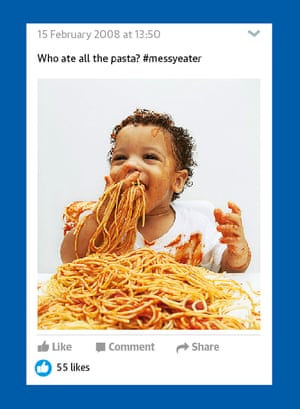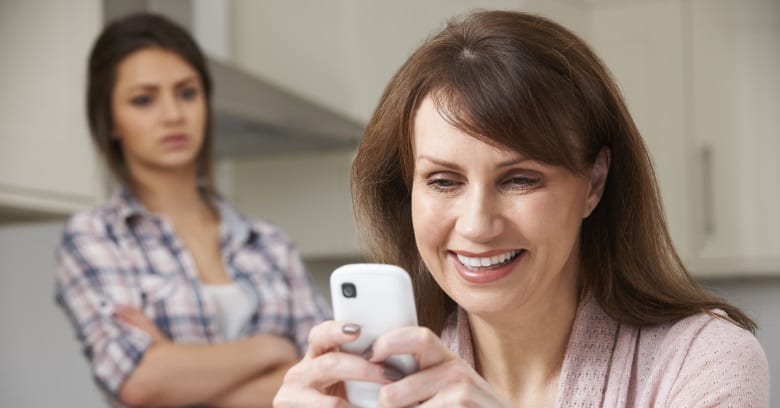Miss Alimi is right: children are unlikely to gain control over their parents’ posting habits. But there is still scope for a conversation about what constitutes fair sharing, and each family will draw its lines differently. Consider the case of Heather Whitten, the Arizona-based photographer and teaching assistant who took the photograph of her husband and son in the shower that Facebook didn’t like. Whitten saw the moment, and the image, as the height of parental care. Their toddler, Fox, had had a temperature for hours. Her husband, Thomas, was trying to cool the child’s fever. For two years, Whitten kept the image private, finally posting it in May after Facebook removed other pictures she had shared of her children. She wanted to take a stand, “to show that it’s just innocent pictures that people are twisting and getting offended by”.
She was unprepared for the response – for the way in which Facebook removed images from her page every time it received sufficient complaints, for the level of disapproval the image provoked, including claims that it was “sexual” or “inappropriate”. But Whitten’s stand had one other unexpected consequence. As the interested and the outraged followed the link to her blog, some began to question the legality, as well as the sense, of showing children naked. “I just thought you were free to post what you wanted on the internet,” Whitten says now. But then she discovered that in the state of Arizona, “you can’t show any naked images of children’s pelvic area or butt, and I realised I was technically breaking a law.”
She removed the blog – “took everything down” – but “in the bigger, moral sense, I don’t feel I’ve done anything wrong. I’m not exploiting my children. I’m not abusing my children. I’m just sharing our lives exactly how they are.”
Whitten’s experience shows just how nebulous and fraught the territory of sharing can be. Sure, her experience would never befall those for whom posting naked images of children is strictly out of bounds. But the case of Whitten is complicated. She and her partner are raising their children “to not be ashamed or embarrassed of their bodies”. They are living online within the offline boundaries they have set for themselves. “People don’t show nudity a lot of times because they think it will have a negative impact on their child. Your footprint is for ever on the internet,” Whitten says. “For me, it’s absurd. I just hope to combat that a little. Who knows how it will actually turn out, but I hope that my children won’t ever look back and see pictures of themselves as children and feel embarrassed by other people seeing them as well. Because there is nothing to be embarrassed about.”
Fox, the toddler in the shower, is still too young to veto or cherish the photograph that caused such controversy, but his older sister Lily, nine, “loves it”, according to her mother. “She couldn’t really wrap her head around why people would think there was anything wrong with it.”
And yet, while Lily was comfortable with the image of her baby brother, she was deeply unhappy with other photographs her mother had uploaded – the apparently harmless kind that many parents post. One day at around the age of six, Lily began to scroll through her mother’s Instagram. “She saw how many pictures there were of her and she didn’t like it,” Whitten says. For months, whenever Lily saw Whitten with the camera, she hid. “That really opened up a conversation about why I take pictures, why I share pictures, who I share pictures with.” Now, Whitten says, “any time you see Lily, it is with her permission”.
Alicia Blum-Ross, a researcher at the London School of Economics, believes we are entering a crucial moment. “We are starting to see kids who have grown up, whose parents have shared images, and who are beginning to say: ‘Wait a minute. I’m not sure I’m comfortable with that.’” What families need, she thinks, is a coming-of-age conversation. After all, it was Lily Whitten herself, at six, who instigated the dialogue with her mother that earned her the right to veto content. Does Lily have advice for other children? “They should say, ‘Please don’t take any pictures of me – it makes me uncomfortable,’” she says. “And ‘I might change my mind one day, but today I don’t want to have to hide from your camera.’” Soon this “digital rulebook” chat might become as standard as the one about the birds and the bees. Blum-Ross sees nothing to fear. Both parties, she points out, are united by being the first generation – of parents and children – to negotiate this path. “It can be a really shared experience,” she says enthusiastically. “The dilemmas are shared dilemmas, the pleasures are shared pleasures. It’s a moment of overlap.”
Blum-Ross, who has three-year-old twins, says she is “not a person who advises total protection. I certainly wouldn’t say, ‘Don’t share things about your children online.’ It’s important that parents are able to claim their own space about that. It’s OK to say, ‘I need this community.’” Whitten, too, has always seen her sharing in those terms: “I feel I share everything as my story – this is my perspective on my life as a mother with these children. I’m not trying to put words in their mouth, or tell the story from their perspective.”
It is one of the oldest questions of storytelling: who does the story belong to? Blum-Ross, Whitten and countless others believe they are telling their own stories, and sharing posts about their children where they fit that perspective. But it’s complicated. “I never had a filter before,” says Whitten, sounding forlorn. “I love the idea of having connections with other mothers and people. But I can’t share the way I used to.” After the Facebook furore, she is still fathoming whether to photograph differently or simply stop sharing.

For other parents, such as the author Amy Webb, who has written about her commitment to post nothing about her daughter online, the same process of consideration deters them from sharing altogether. They have the big conversation – with themselves, each other, sometimes their children – and decide the best answer is silence.





![[Video] How to get rid of bed bugs in Toronto](https://www.thehowtozone.com/wp-content/uploads/2019/10/maxresdefault-2-100x70.jpg)


